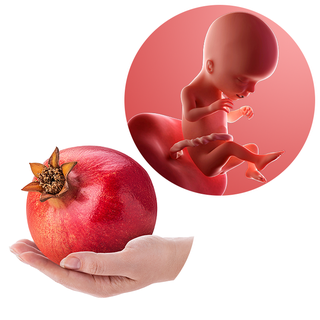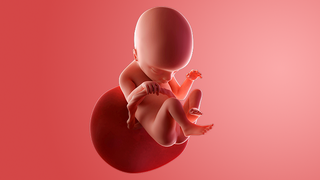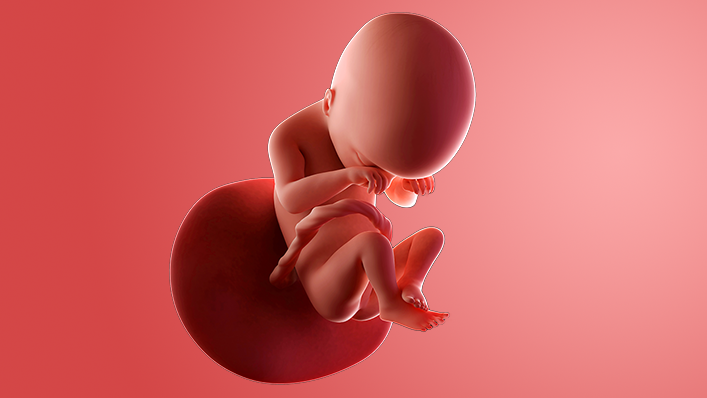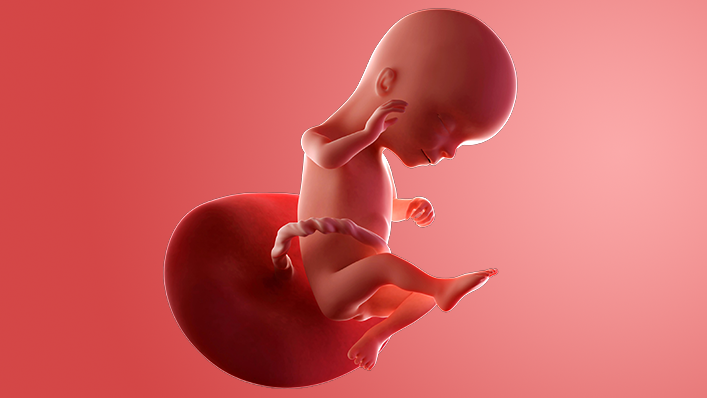What's happening in my body?
Week by week, your baby's getting bigger, and so is your placenta, which is feeding your baby and also removing waste. By the end of your pregnancy the placenta will weigh around 500g, which is as heavy as a packet of pasta.
Your waist will start to vanish as your womb moves up and out of your pelvis. This will make you look more obviously pregnant.
Around 1 in 10 women feel stressed or anxious during their pregnancy, and hormones can make even small problems feel overwhelming.
If you feel sad or worried, talk to your doctor or midwife – there's a big support network out there for you.
Your baby's movements
Many women spot the first signs of their baby moving between 18 and 24 weeks.
Inside your tummy, you might feel:
- bubbling
- fluttering
- rolling
You might find that your baby moves more:
- after meals
- when you listen to loud music
- when you rub your tummy and talk to your baby
- when you are relaxing
Stretch marks
Depending on your skin colour, you might notice pink, red, purple or brown streaks over your stomach and breasts. They may also appear on your bottom and thighs.
These are stretch marks and affect up to 8 in 10 women. They are usually caused by hormones and your skin stretching. They usually fade to silver and become much less noticeable after your baby is born.
2nd trimester pregnancy symptoms (at 17 weeks)
You may be getting a few aches and pains as your bump gets bigger. Your symptoms should be manageable, but talk to your doctor or midwife if they're not.
Your signs of pregnancy could include:
- tiredness and sleeping problems (week 19 has information about feeling tired)
- swollen and bleeding gums (week 13 has information about gum health during pregnancy)
- pains on the side of your belly, caused by your expanding womb (known as 'round ligament pains')
- headaches
- nosebleeds
- bloating and constipation (read about bloating on week 16's page)
- indigestion and heartburn (week 25 talks about digestive problems)
- sore breasts
- leg cramps
- feeling hot
- dizziness
- swollen hands and feet
- urine infections
- vaginal infections (see week 15 for vaginal health)
- darkened skin on your face or brown patches – this is known as chloasma or the "mask of pregnancy"
- greasier, spotty skin
- thicker and shinier hair
You may also experience symptoms from earlier weeks, such as:
- morning sickness (read about dealing with morning sickness on week 6's page)
- weird pregnancy cravings (read about pregnancy cravings on week 5's page)
- a heightened sense of smell
- mood swings (week 8's page has information on mood swings)
- a white milky pregnancy discharge from your vagina and light spotting (seek medical advice for any bleeding)
What does my baby look like?
Your baby, or foetus, is around 12cm long, from head to bottom. That's roughly the size of a pomegranate.
Your baby can:
- move their eyes, although they'll stay shut for now
- react to loud noises
- open and close their mouth
Your baby's fingernails are starting to grow and will have their own unique fingerprints. Even identical twins have different fingerprints.

Action stations
Have you decided where you'd like to give birth? Read more about choosing a hospital, midwife-led unit or home birth, and talk to your doctor or midwife about your local options.
It's a big decision but you can always change your mind later.
More in week-by-week

Week 18
You may feel your baby move for the first time around now. If you do, it may feel like a gentle fluttering sensation.
More in week-by-week guide to pregnancy


